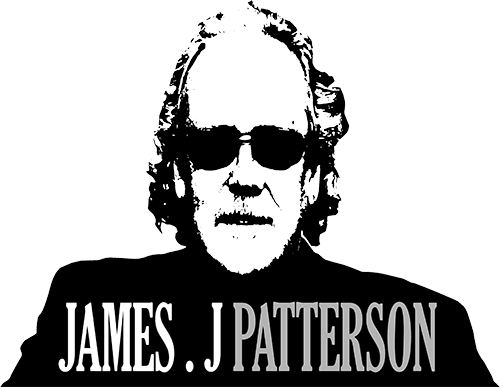Thomas Paine Scholar At Gadsby’s Tavern!
Paine Scholar Patrick Hughes was the featured speaker at Thomas Paine’s 274th birthday celebration at Gadsby’s Tavern in Old Town Alexandria on Jan. 29th. Mr. Hughes gave an inspired talk on Paine birthday celebrations over the past 200 years and helped Alan Squire Publishing revive this proud tradition! Read Mr. Hughes’ “Dispelling The Mist Of Oblivion,” here!
Patrick W. Hughes
“Dispelling the Mist of Oblivion: On Thomas Paine’s 274th Birthday.â€
January 29, 2011.
Gadsby’s Tavern, Alexandria, Virginia.
Question to the Audience: “Is anyone here a chemist?†We are all going to have to be very careful, at least according to the opinion of a writer in the Pittsburgh Gazette of March 13, 1834 which reported that a chemist named Cohen who was a professed “atheist†blew himself up during an experiment. The author of the article then cannot resist a bit of moralizing when he goes on to say that the fate of this atheist Cohen should serve as a dire warning to those who celebrate the birthday of that other notorious atheist Thomas Paine. So if anyone here may fear divine retribution for being here, I fully understand if you would like to leave.
My name is Patrick Hughes and I am currently in the dissertation stage of my PhD in Religious Studies at the University of Pittsburgh. I am working on the transatlantic controversy created by Paine’s The Age of Reason, a book which really saw Paine’s reputation go into a free-fall. I am very glad to be here tonight because it will be a nice change of pace to hear some nice things said about Paine, since so much of my research deals with those who were not quite so pleased with what Paine said about the Bible, Christianity or revealed religion, and who often lambasted Paine with all sorts of awful names.
As the Pittsburgh article indicates, Paine’s reputation has seen its ups and downs.
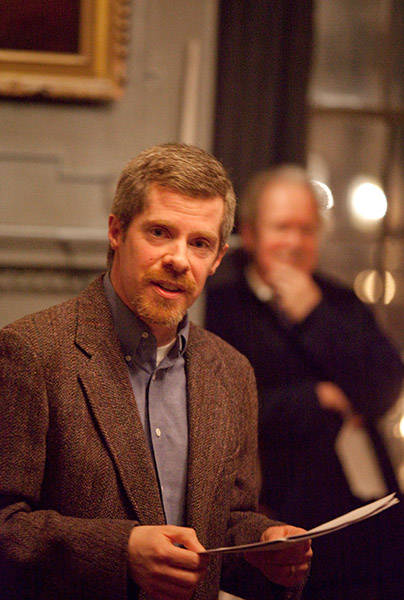
From the wild popularity of Common Sense which shot him into international fame, such that Paine was often referred to (and often referred to himself) simply as “Common Sense.†Paine’s defense of the principles of the French Revolution in The Rights of Man in the early 1790s made him a hero of working class radicals and the bane of social conservatives like Edmund Burke. Yet it was Paine’s interest in matters theological that really turned even some of his biggest fans against him, and his full scale attack on the Bible, Christianity and revealed religion in The Age of Reason continues to haunt his reputation. Many of you are probably familiar with Teddy’ Roosevelt’s characterization of Paine as a “filthy little atheistâ€. Roosevelt was building on a century-long tradition that disparaged Paine for his religious beliefs, which were seen as part and parcel of his moral and personal failings, such as being an anti-social, slovenly drunkard. It is evident that Paine’s reputation still suffers from the Age of Reason. For example, in 2007 the Arkansas state House of Representatives considered a bill to officially recognize Paine’s birthday. However, during the floor debate one of the republican representatives quoted from The Age of Reason to show that while Paine had done “some good things for the nation†he was ultimately “anti-Christian and anti-Jewish’., and the bill was ultimately defeated. Teddy Roosevelt got it wrong: Paine was certainly not an atheist and in the first few pages of the Age of Reason he is very clear about his belief in God. I do, however, think this Arkansas rep hit the nail on the head since, Paine was pretty anti-Christian and anti-Jewish (not the people, but the doctrines and the organized aspects of it).
I think that what Paine really feared most was being ignored or forgotten—this comes through in the correspondence of his later years, and it helps to explain much of the outrage of his public Letter to George Washington, in which he blames Washington for letting him languish in a French prison for nearly a year. There is no doubt that Paine was a master polemicist and he had a mischievous delight in being at the center of a controversy and in locking horns with his opponents. Part of what makes his writing so fun to read at times is that he was also a master of the turn of a phrase that could cut an enemy off at the knees. For someone who so delighted in controversy, to be ignored was anathema, to be forgotten, an abomination.
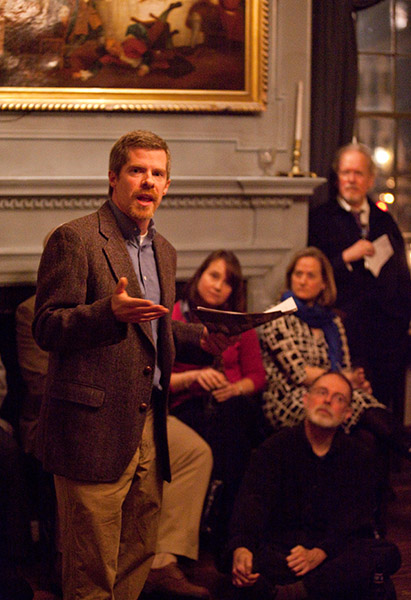
One of Paine’s more colorful adversaries in the controversy stirred up by the Age of Reason was a Scotsman by the name of James Tytler, who also was known as “Balloon Tytler†for being the first person in Britain to ascend in a hot air balloon. In his responses to Paine’s the Age of Reason, Tytler predicted that “before the expiration of half a century, Paine and his Age of Reason, as well as I and my answers, will be covered with the mist of oblivionâ€. Yet as two centuries have passed since his death, it is clear that Paine has not been forgotten and still less can he be ignored. Paine would have been supremely qualified in defending himself against what the great British historian E.P. Thompson has called the “enormous condescension of posterity.†And yet the task is left to us here this evening—and even if we cannot defend Paine as adequately as he could defend himself, we can at least praise and remember him fondly on his 274th birthday.
And in remembering Paine on his birthday we are not alone either geographically nor historically. I do not know how many similar celebrations are taking place in either in the US or in Britain, but I do know that there is a similar celebration in Wisconsin, being lead by Harvey Kaye, who wrote the recent book Thomas Paine and the Promise of America. I have only known Dr. Kaye for only about a year, but I emailed him about this event and he was extremely excited to know that we were meeting here tonight, and he sent me the following letter:
“Greetings to friends of Thomas Paine! We gather all across the USA – believe me, ALL ACROSS THE USA! – to celebrate the birthday of the man who in 1776 grabbed hold of Americans’ finest hopes and
aspirations and not only called for an independent United States of America but also articulated America’s world historic purpose and promise – to liberate men and women from tyranny and pursue freedom, equality, and democracy, indeed, to deny the claims of the powers that be and forever struggle to extend and deepen freedom, equality, and democracy.
COMMON SENSE, THE CRISIS, PUBLIC GOOD, RIGHTS OF MAN, THE AGE OF REASON, AGRARIAN JUSTICE – “The sun never shined on a cause of greater worth!”
The powerful, propertied, prestigious, and pious had reason to fear Paine. Paine he enabled us to see ourselves as citizens not subjects – citizens in every respect: politically, economically, culturally, intellectually.
Long live the memory and legacy of the revolutionary patriot and citizen of the world, Thomas Paine.
Sincerely,
Harvey J. Kayeâ€
[Publisher’s Note: Find Mr. Kaye’s marvelous book, Thomas Paine And The Promise Of America, here!]
In honoring Paine’s birthday we are continuing a tradition that is at least 190 years old, and perhaps a bit older. It is not really clear when people first got together to celebrate Paine’s memory on his birthday—some have claimed that it began in London in 1810, the year after Paine died, although I haven’t seen much evidence to support this. The first well documented account of a Paine birthday celebration dates to 1821 and took place probably in London. When I was doing research in Philadelphia at the American Philosophical Society Library a couple of years ago I ran across a broadside that reprinted the poetical address delivered by J.W. Dunstone to honor Paine at this 1821 celebration, so if you will indulge me, I think it fitting that we should hear a very short bit of this poem honoring Paine:
This was the natal day of him who sleeps,
Beneath the sod where TYRANNY still weeps;
Then hither every Virtue wend your way,
A last sad duty at his shrine to pay…
But PEACE sweetly smiling, revisit the earth,
And all shall rejoice on the day of thy birth,
Shall hail thee! Who dared Common Sense to maintain,
And give blessings and plaudits eternal to Paine!
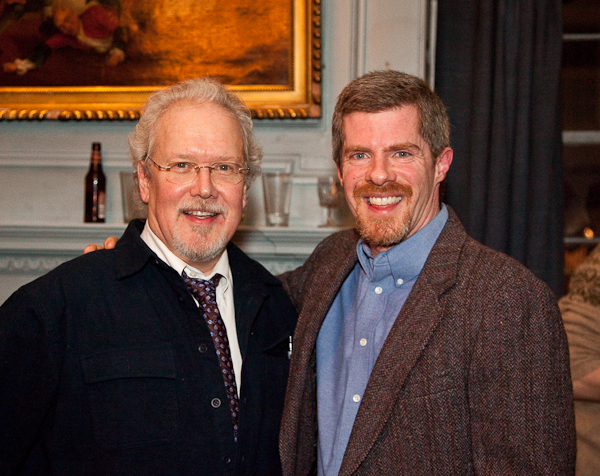
Now, the first American birthday celebration took place in New York City and was primarily organized by a bunch of expatriates from Britain such as Gilbert Vale, who shines brightly in the Paine pantheon as one of the earliest men to try to resuscitate the memory and reputation of Paine. Vale was instrumental in trying to get a memorial to Paine erected in New Rochelle, NY, and he wrote a biography of Paine in 1841 that tried to counter the scurrilous biographies of Paine that had been written. Vale admitted to his utter surprise that when he immigrated to New York in the early 1820s he found “that with whomsoever you might converse, with few exceptions, the name of Thomas Paine was treated with contempt.†Vale ascribes this to “sheer religious bigotry, together with the thousands of falsehoods uttered from pulpits respecting his moral character, that had poisoned the minds of the rising generation against him.†Vale therefore decided that he and the “Liberals of New York†would meet to celebrate Paine’s birthday for the first time in the United States. They did not have an easy time of securing a venue for the event, since a number of tavern-owners refused to let such an “infidel as Thomas Paine†be celebrated under their roof.
Two years later, in 1827, we have the report from a New York newspaper that gave some details of what was an emerging tradition. It reported that the Paine birthday celebration began with a meal (which was reported as “excellentâ€), after which a number of toasts were given, including a speech by a Mr. Carver who reminded us that “There never was a people more indebted to an individual, than the Americans are to Thomas Paine for the liberties which they enjoy.â€
Here then are a few of the toasts that were then given:
• The memory of Thomas Paine. (in solemn silence, the company standing)
• To Jefferson, Franklin, Washington, Voltaire, and Andrew Jackson
• To “An unshackled Press—the terror of despots—the bulwark of freemen—the hope of slavesâ€
In addition to these toasts, it was reported that “ Several appropriate Songs were sung.†I’m pretty sure that one of them was NOT “Happy Birthday to youâ€. Probably they were patriotic songs of the day, and perhaps there was a song or two written specifically to celebrate Paine, similar to one that was written a few years later by George McFarland which was set to the tune of “Sun Flower.†The song is quite long, but here are the opening and closing verses: (I don’t know the tune, so I’ll just give you the lyrics)
Oh! Believe not the slanders invention has framed
‘Gainst the patriot honest and true,
But with highest respect let him ever be named,
And give honor where honor is due
While Freedom shall swell an American breast,
Or throb through a patriot’s veins,
We will yield him a place with the honest and best,
And hallow the Birthday of Paine.
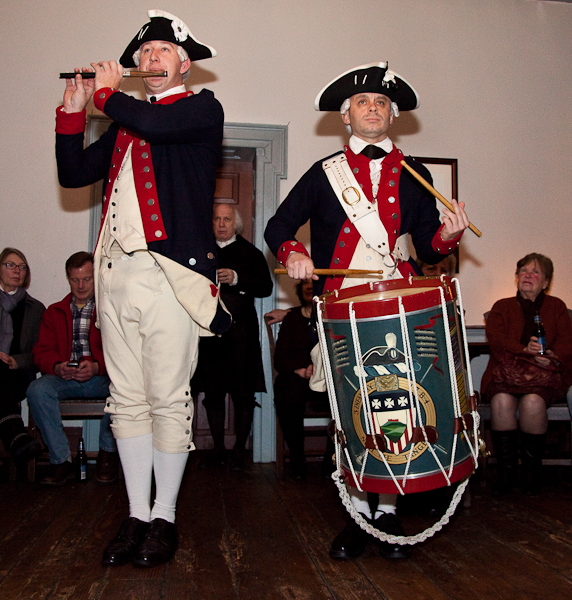
Finally, the newspaper report on this 1827 celebration indicates that “The greatest harmony and conviviality prevailed and the company retired at an early hour, evidently much gratified with the proceedings, and deeply impressed with the importance of continuing the celebration of this anniversaryâ€
And indeed the celebration not only continued, but began to spread, so that by 1830s similar celebrations were occurring in places such as Albany, Boston, Pittsburgh, Providence, Cincinnati, and St. Louis. Some of the events had elaborate balls following a dinner that was filled with addresses and toasts to Paine. Some celebrations in New York got a bit rowdy and ribald, while others, such as those in Boston were a bit more staid and reserved. The first event in Cincinnati in 1838 reportedly was accompanied by the firing of canons.
In 1853, Ernestine Rose, the notorious freethinker, abolitionist and suffragist, was the first woman to head up the New York Paine celebration. A sneering account of this celebration appeared in the New York Times which reported that “The strong-minded of the weaker, and the weak-minded of the stronger sex, were gathered to the number of two hundred.†Ernestine Rose toasted Paine as “the star that pointed the way to Independence†thereby creating the “model republic of the world, WITH ONE BLACK SPOT IN ITâ€
In 1877 Walt Whitman attended a Paine birthday celebration in Philadelphia and he delivered an address “In Memory of Thomas Paine†in which he thinks that Paine deserves a “good portion†of the credit for American “independence†as well as our “ardent belief in, and substantial practice of RADICAL HUMAN RIGHTS [isn’t this a great phrase, ‘radical human rights’?]—and the severance of its government from all ecclesiastical and superstitious domination†Whitman hopes that Americans will once again learn to “better dwell on her choicest possessionâ€â€”the legacy of our good and faithful men such as Paine.
What are some of the commonalities of the earliest Paine birthday celebrations? Well, one continual thread is that they were often arranged and attended by folks who had some pretty radical agendas, and if we want to apply some labels we could start with words like “freethinkersâ€â€¦â€working class organizersâ€â€¦â€œbirth control advocatesâ€â€¦ “women’s rights crusadersâ€â€¦ “abolitionistsâ€â€”not bad company to keep!
Another constant of the Paine birthday celebrations, from the very beginning and continuing tonight, is the real desire to keep Paine’s legacy alive. It seems that in every generation there is the fear that Paine has been forgotten, and that his legacy needs to be revived or resuscitated. This goes back to the first birthday celebrations and continues today. Paine has been called the “The Forgotten Founding Father,†“The forgotten prophetâ€, and my favorite for its wordplay: “The Lost Founder.â€
Paine’s memory has certainly taken its hits, but he has not yet been forgotten. His writings have been invoked across the spectrum of present day politics—Ronald Regan paraphrased Paine, Glenn Beck titled a recent book “Common Sense†and hoped it would be as popular and inspirational as the original, Sarah Palin opens her recent book with a quote from Paine. And it isn’t only from the right—I’m not sure exactly where to put our current president—centrist?, left-centrist? Islamo-socialist-fascist? Anyhow, I was able to impress my wife when Barak Obama quoted Paine in his inaugural address (without proper attribution) and I yelled at the TV—“Hey, that’s Paine he just quotedâ€. That is to say I THINK my wife was impressed that I could spot a Paine quote—at least it may have given her some satisfaction for having supported me through grad school for the past 9 years. And Paine does pop up in some quite unexpected places: [show the Hyundai car add from the January 10, 2011 Time Magazine that has a picture of a woman sitting in the back of a car reading Paine’s “Common Senseâ€
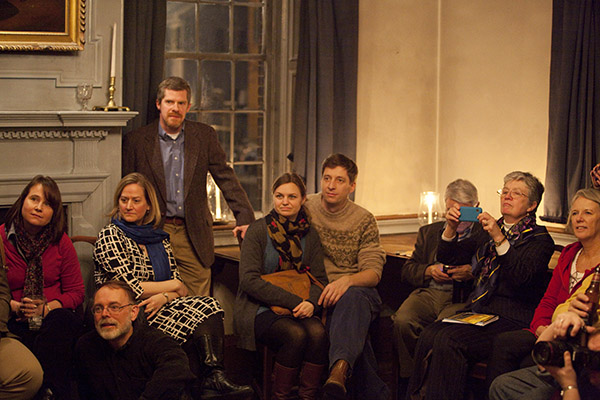
And I can’t finish my talk without giving you what I found to be one of the most humorous analogies about Paine in a 2006 New Yorker article by Jill Lepore where she writes that “Thomas Paine is, at best, a lesser Founder. In the comic-book version of history that serves as our national heritage, where the Founding Fathers are like the Hanna-Barbera Super Friends, Paine is Aquaman to Washington’s Superman and Jefferson’s Batman; we never find out how he got his superpowers, and he only shows up when they need someone who can swim. For all that, Paine’s contributions to the nation’s founding would be hard to overstate.†This appeals to me as a child of the 1970s who grew up watching these guys on Saturday morning TV.
So Paine cannot be ignored and he has certainly not been forgotten. I feel that by my quoting of others I have already given a number of toasts to Paine. But as an ending to my talk, I would like to make two toasts. For my first toast I would like to take the 1827 birthday celebration as a rule of order. As reported, the first toast of that evening so long ago was to “The memory of Thomas Paineâ€, with the “company standing†all in “solemn silenceâ€. So please raise yourselves up, and join me in taking a moment of solemn silence to remember Thomas Paine. “TO THE MEMORY OF THOMAS PAINEâ€
Before giving up the floor, I would like to propose another toast, this time to those who have labored to keep Paine’s memory alive for over 200 years. So please raise your glasses to the following individuals: To Daniel Isaac Eaton, William Cobbett (who dug up Paine’s bones and brought them back to England), Richard Carlile (who was imprisoned for re-publishing Paine’s writings), Gilbert Vale, Ernestine Rose, Abner Kneeland (who was the last man jailed for blasphemy in Massachusetts), Marcus Casey, Moncure Daniel Conway (whose biography of Paine is still a standard), Robert Ingersoll, D.M. Bennett, Walt Whitman, Richard Gimbel (a retired Air Force Colonel who collected all things dealing with Paine, the collection of which is in the American Philosophical Society), Alfred Owen Aldridge, Christopher Hitchens (the journalist who I think sees himself as a modern-day Paine), Harvey Kaye, and Jimmy Patterson for hosting this event tonight. And to all of you for being here! CHEERS!
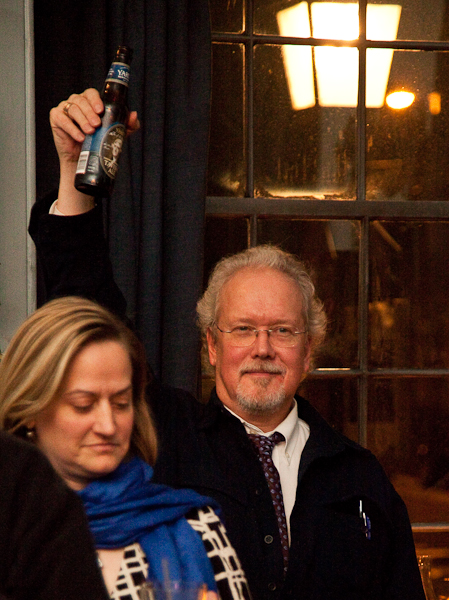
Patterson: Thank you Mr. Hughes for making our event celebrating Thomas Paine’s birthday so special!
